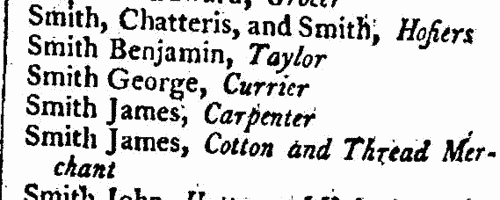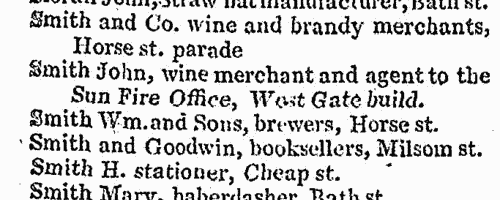Greenhaugh Surname Ancestry ResultsOur indexes 1000-1999 include entries for the spelling 'greenhaugh'. In the period you have requested, we have the following 9 records (displaying 1 to 9): Buy all | | | Get all 9 records to view, to save and print for £52.00 |
These sample scans are from the original record. You will get scans of the full pages or articles where the surname you searched for has been found. Your web browser may prevent the sample windows from opening; in this case please change your browser settings to allow pop-up windows from this site. Tenants, founders and incumbents of Lancashire chantries
(1546-1554)
Chantries were established to perform services for the souls of their founders and other faithful dead, including annual obits and anniversaries at which alms were usually distributed. The chantries could be at an existing altar in a parish church, a new altar in a side chapel of an existing church, in a new chapel in the churchyard or some miles from an existing church: few were founded before 1300, and most date from 1450 to 1500. Hospitals were places provided by similar foundations to receive the poor and weak; there were also religious guilds, brotherhoods and fraternities, and colleges (like large chantries at which three or more secular priests lived in common). An Act of Parliament of 1545 gave king Henry VIII the power to dissolve such chantries, chapels, &c., the proceeds to be devoted to the expenses of the wars in France and Scotland. Commissioners were appointed 14 February 1546 to survey the chantries and seize their property, and from 1546 to 1548 the commissioners produced these certificates giving brief details of the establishment and nature of each foundation, with an inventory of valuables and rental of lands. The individuals named in the certificates are thus the founder, the present incumbent, and the tenants whose rents provided the chantry's income. All the surviving certificates for Lancashire were edited by the Reverend F. R. Raines for the Chetham Society, and published from 1862.GREENHAUGH. Cost: £6.00.  | Sample scan, click to enlarge

| Official Papers
(1625-1626)
The State Papers Domestic cover all manner of business relating to Britain, Ireland and the colonies, conducted in the office of the Secretary of State as well as other miscellaneous records.
GREENHAUGH. Cost: £4.00.  | Sample scan, click to enlarge

|  Apprentices registered at Liverpool in Lancashire
(1719-1721) Apprentices registered at Liverpool in Lancashire
(1719-1721)
Apprenticeship indentures and clerks' articles were subject to a 6d or 12d per pound stamp duty: the registers of the payments usually give the master's trade, address, and occupation, and the apprentice's father's name and address, as well as details of the date and length of the apprenticeship. There are central registers for collections of the stamp duty in London, as well as returns from collectors in the provinces. These collectors generally received duty just from their own county, but sometimes from further afield. Because of the delay before some collectors made their returns, this register includes indentures and articles from as early as 1718. (The sample entry shown on this scan is taken from a Norfolk return)GREENHAUGH. Cost: £8.00.  | Sample scan, click to enlarge

| The English in Madras
(1744-1755)
Henry Dodwell, curator of the Madras Record Office, compiled a 'Calendar of the Madras Despatches', published in 1920, interweaving despatches in his archives from the India Office to and from their governors at Fort St David and Fort St George with similar material from the India Office archives in London. All manner of commercial, political, military and diplomatic affairs are touched upon: the people mentioned are mainly merchants, officials, clerks, soldiers, and officers of the naval squadrons patrolling the seas from England to India and on to the East Indies and China. GREENHAUGH. Cost: £4.00.  | Sample scan, click to enlarge

| Merchants and traders in Newcastle-upon-Tyne
(1480-1770)
The society of Merchant Adventurers of Newcastle-upon-Tyne consisted of those who had obtained freedom of the city (allowing them to trade there) by birth as a son of, or apprenticeship, to a freeman: and within that, freedom of one of the three 'trades', i. e. boothman, draper or mercer. F. W. Dendy prepared extracts from the merchant adventurers' records, the first volume, published by the Surtees Society in 1895, containing extracts from the ordinances of the society through to 1894, the great majority being, however, from the 16th to 18th centuries. The Merchants' Company was founded with a series of enactments for their guidance and governance. But Dendy remarks that "Experience soon convinced them of the need of other laws, and these were framed from time to time. But during a very considerable period the members of the Society seem to have been influenced by a love of legislating, and their bye-laws increased to an unnecessary and perplexing extent." Indeed, many of the later ordinances amount to no more than minutes of particular orders aimed at particular people. GREENHAUGH. Cost: £4.00.  | Sample scan, click to enlarge

| Inhabitants of Wigan in Lancashire
(1790-1797)
The provincial sections of the Universal British Directory include lists of gentry and traders from each town and the surrounding countryside, with names of local surgeons, lawyers, postmasters, carriers, &c. (the sample scan here is from the section for Nottingham). The directory started publication in 1791, but was not completed for some years, and the provincial lists, sent in by local agents, can date back as early as 1790 and as late as 1797.
GREENHAUGH. Cost: £6.00.  | Sample scan, click to enlarge

|  Apprentices and clerks
(1801) Apprentices and clerks
(1801)
Apprenticeship indentures and clerks' articles were subject to a 6d or 12d per pound stamp duty: the registers of the payments usually give the master's trade, address, and occupation, and the apprentice's name, as well as details of the date and length of the apprenticeship. 2 January to 31 December 1801. IR 1/38GREENHAUGH. Cost: £8.00.  | Sample scan, click to enlarge

| Inhabitants of Kendal, in Westmorland
(1805)
Holden's Triennial Directory of 1805 to 1807 included a provincial section, listing professional people and traders in England, Wales, Scotland and Ireland. (The sample scan here is from the listing for Bath)GREENHAUGH. Cost: £6.00.  | Sample scan, click to enlarge

| Residents of Yeovil
(1954)
The Yeovil and District Directory for 1954-1955 compiled and published by Edwin Snell & Sons includes an alphabetical directory of residents in Yeovil and Yeovil Without, a trades directory, and lists of officials and officers of the various local societies and institutions, all covered by this index.GREENHAUGH. Cost: £6.00.  | Sample scan, click to enlarge

|
Research your ancestry, family history, genealogy and one-name study by direct access to original records and archives indexed by surname.
|












